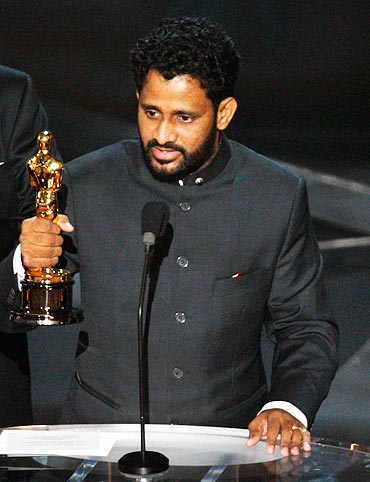
Pookutty came to films quite by accident, a career he had never imagined as he grew up in a poor family in Kerala.
At the FTII, Pookutty was introduced to world cinema and the training he received has served him well. In the late 1990s when he entered the film industry in Mumbai very few filmmakers valued sound designers and engineers.
Over the years Pookutty has worked with many directors, some whom he holds in high regard.
He was in Los Angeles recently finishing work on S Shankar's grand project Endhiran(watch the trailer here) -- starring Rajanikanth and Aishwarya Rai.
Pookutty spoke to Aseem Chhabra about his favourite directors and why he will work with them again.
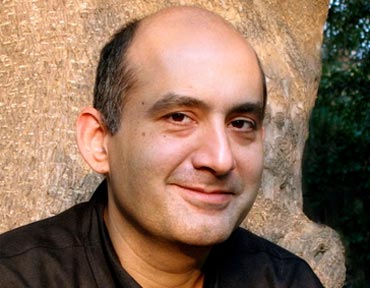
Dev is definitely one of the most interesting filmmakers of our times, way ahead in 1994 when he made English August.
That film actually paved the way for an urban cinema to evolve. It is like what happened in literature when the new Indian English writers emerged. Dev really understands international cinema.
I haven't seen his new film Road, Movie, but my association with Dev goes back to working on one of my early films Split Wide Open.
We were just beginning to recognise digital technology at that time and Dev in that sense was very ahead of us in his understanding.
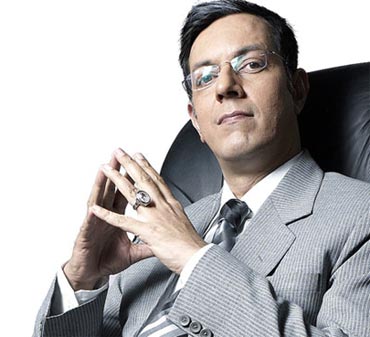
All of these people were our idols. They made a certain kind of personal cinema -- their language and the medium was very important for me at that time.
Rajat and I made our first film together (Kapoor's Private Detective: Two Plus Two Plus One) and Rafey Mahmood was the cameraman on it.
From there I have seen the growth of Rajat -- until Mithya.
His new film Fatso is phenomenal, but I think with Mithya he reached the peak of his career in terms of creativity.
I have seen Rajat over a period of time, how his ideas have evolved in the midst of the mainstream film industry.
Independent Indian cinema is going through a very difficult time, with the new economy and the new business ideas emerging in the film industry.
I think the kind of films Rajat is making can truly be called independent cinema, even though it is very difficult to sustain in this area.
Mani Kaul's and Kumar Shahani's films were never released commercially, but we always loved them. Rajat's work may seem to be obscured by the mainstream Hindi films, but he has managed to break that barrier.
For our first movie we had one print. And then we released Raghu Romeo with 10 prints, Mixed Doubles with 35 prints.
We were jumping around, because it was unfathomable for us to even come to that level of getting commercial acceptance.
I see a truly original Indian thought in terms of content and form evolving out of Rajat.
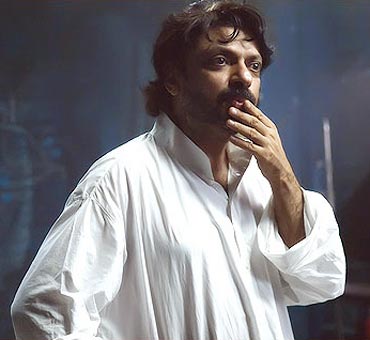
I think in mainstream Hindi cinema he stands tall. For my personal taste his films are a bit loud and overdramatic, but I give it to him, because for me he comes from the school of Ritwik Ghatak.
He is the only one who is practicing that Ghatakian school of thought in mainstream Hindi cinema and he understands that very well.
There are different kinds of personal journeys of filmmakers. Like the way Mani Kaul and Kumar Shahni have gone through their own personal filmmaking journeys, Bhansali is doing that through mainstream cinema and he has the guts to do that in his own way.
You look at the biggest production houses like Yash Raj and Dharma Productions -- they are not committed to an image the way Bhansali is. He understands the medium and its language.
If you look at the true meaning of Hindi cinema -- with all its globalisation, with the economic crisis that films are facing today -- the reason why Hindi cinema is standing on its feet and surviving is because of the dance-drama tradition that we come from.
Bhansali is one person who understands that in a very personal way. He is trying to practice that in his own way.
For me Ghatak's lighter version was Guru Dutt and his lighter version is Bhansali. I love him for that.
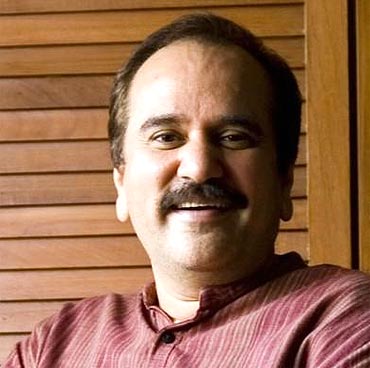
I loved the way he dealt with actors and the way he was sensitive about things. I saw a great restraint in him as an artist, which is often missing in mainstream filmmakers in Hindi cinema, because their only intention is to make successful films.
For Feroze the commercial success of his film was just one thing he had to think about. As an artist he felt the need to be sensitive with one's art and culture and he practiced that in making Gandhi My Father.
I think 60 plus years after India's independence -- if you look at the commercial and the social meaning of India today, why today's youth has a sense of hopelessness, it is because we don't have a social leader, a politician and a philosopher that the youth can look up to.
Gandhi was that last man.
I thought for me it was a great opportunity to work on a film based on Gandhi's life.
Anil Kapoor is a colleague, but he was a great producer and a very sensitive man. And that combination of Anil and Feroze -- even though unfortunately the film didn't get much commercial success -- was wonderful. I loved working with them.
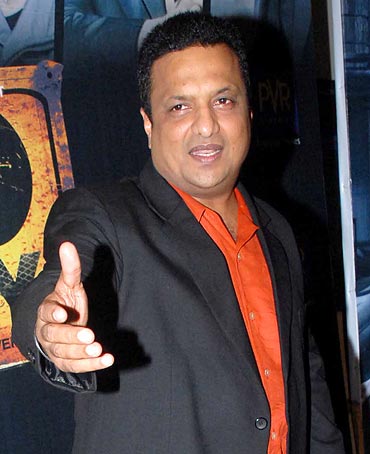
I asked him what he would have become if he was not a filmmaker. And he said a gangster, because he loved guns and women and loved films that featured them. Dev Benegal told me he would have become a software developer or a computer engineer.
I have done many films with Sanjay -- Woodstock Vila, Musafir, Zinda, Dus Kahaniyaan.
Gupta and I share a very good relationship. He always calls me when he gets a new script.
I like the trust he puts in his technicians. He shoots the film, edits it and then leaves it to me. If I feel like suggesting some corrections, we argue it out. But then he allows me the freedom to grow as a technician.
When a director puts so much faith in you, on what he has made, you become a far more responsible technician. You walk a tight rope there, but it helps creativity.
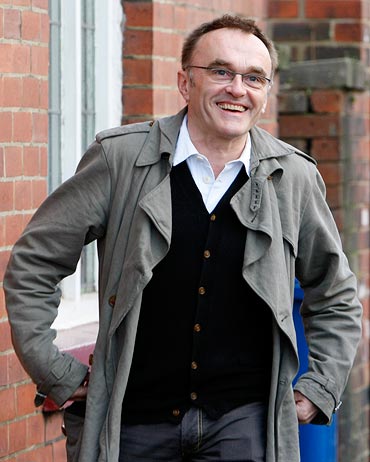
Essentially while I am a sound man, I am also a filmmaker. Danny taught me when we make a film we want the best out of people.
Danny -- with his work and the way he conducted himself through the making of Slumdog Millionaire -- he taught me to become a better human being.
I would say he is one of the greatest humanists I have ever worked with.
When you speak to Danny, he makes you think that you are Danny Boyle and he is some insignificant guy. That is an amazing quality.
He came to India, lived there and he tried to understand the country. He never wanted to change anything, in the process of shooting in a place like India.
That put me most of the time on tenterhooks, because he didn't want to disturb the place or its people.
I see Danny practicing the idea that documentary is about people and process.
I loved spending time with that man; every minute that I spent with him enriched me in understanding cinema and understanding people. That's the quality I find in Rajat also.
I never saw Danny -- not once -- lose his temper or bad mouthing anyone else. He's a saint!